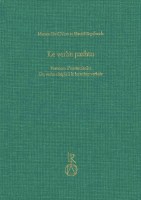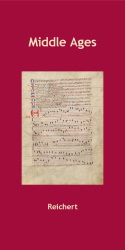Search
De Chiara, Matteo; Septfonds, Daniel
Le verbe pashto
Parcours d’un territoire du verbe simple à la locution verbale
2019
17.0 x 24.0 cm, 176 p., 1 illustrations b/w, cloth
ISBN: 9783954903757
go to ebook version
17.0 x 24.0 cm, 176 p., 1 illustrations b/w, cloth
78,00 €
ISBN: 9783954903757
go to ebook version
Short Description
In this work, the Authors provide an analysis of the entire verbal system of Pashto, the language of some 50 million speakers in Afghanistan, Pakistan and diasporas. As an Iranian language, Pashto verbs share some main behaviours with the other sister languages, as Persian and Kurdish, but with some peculiarities. This study will permit to fully understand Pashto verbal system from the syntactic and morphologic points of view, at the same time offering complete dialectological, typological and lexicographical information, as well as ample phraseologies.Description
Pashto is an Iranian language spoken by almost 50 million speakers in eastern Afghanistan, western Pakistan, as well as in an important diaspora. Pashto, official language of the Afghan refugees along with Dari (Afghan Persian), is nowadays the focus of a growing interest, not only in the humanitarian field but also in linguistic studies.Its verbal system presents many peculiarities and interesting characteristics, which until now have been neglected, even if they could help clarify the whole Iranian verbal system. This work aims at describing the entire verbal system of Pashto, highlighting all the theoretical problems, and contributing to the advancement of our knowledge in the Pashto and general linguistics.
The work opens with an analysis of the Pashto verbal system from a syntactic perspective: we can identify three kinds of verbs: transitive, intransitive and anti-impersonal. After that, the Authors deal with the morphologic perspective, according to which all verbs can be divided in Simple Verbs, Verbalizers, Compound Verbs, Mixed Verbs and Light Verb Constructions. A detailed presentation of the sources of dialectal variation completes this first part.
From chapter 4 to chapter 8 all the categories of verbs abovementioned are treated in detail. For each class of verbs all existing exceptions and irregularities are taken into account, thus identifying three main processes of regularization, called “frontiers”.
Two appendixes complete the work: the first one proposes a model of the conjugation and provides all the possible variants; the second appendix proposes a detailed analysis of twelve verbs, completed with dialectology, phraseology and lexicology. This part foreshadows a second volume which will contain a detailed study of all Pashto simple verbs.
The manifold audience to which this work addresses is composed principally by scholars and researchers involved in the fields of linguistics and Pashto and Iranian studies, but also by students of Pashto language and by all those working in the humanitarian field and with refugees.
Biographical Note
Matteo De Chiara (Rome, 27/9/1976), PhD in Iranian Studies at the University of Naples « L’Orientale », is Maître de Conférences HDR at the Inalco of Paris, where he teaches Pashto language and Iranian philology. He participated to many research projects in collaboration with Adriano V. Rossi and other scholars in the domain of the Iranian studies (2001-2010). He benefited of a research grant at the University of Mainz to study the Khotanese Sudhanāvadāna (2008-2010).Daniel Septfonds (Paris, 8/3/1946) is Emeritus Professor of Pashto and linguistics at the Inalco of Paris, where he was in charge from 1976 to 2011. He worked mainly on Pashto dialectology and oral literature. He also brings on his researches for the description of the Ormuri (Breki) of Kaniguram, an Iranian language spoken in the middle of the south Waziristan tribal region. He carried out many CNRS missions to Pakistan and Afghanistan.
Series Description
The series Beiträge zur Iranistik was founded in the 1960s by Georges Redard and subsequently edited by Nicholas Sims-Williams from 1997 to 2020; the present series editor is Agnes Korn. The series publishes works on the languages of the Iranian branch of Indo-European. The focus is on linguistics, including grammars, dictionaries, text editions, philology as well as diachronic and synchronic studies of linguistic topics. Neighbouring fields such as literature, archaeology and anthropology are likewise represented. The languages of the series are English, German and French. The Beiträge zur Iranistik are represented in libraries internationally and are widely used standard works of Iranian studies.Verwandte Reihen:




 Preface
Preface

 Neuerscheinungen 2023/2024
Neuerscheinungen 2023/2024
 Gesamtverzeichnis 2023/2024
Gesamtverzeichnis 2023/2024
 Katalog Oriental Studies & Linguistics
Katalog Oriental Studies & Linguistics
 Mittelalter
Mittelalter
 Deutsche Inschriften
Deutsche Inschriften
 Musiktherapie
Musiktherapie
 Literaturen im Kontext
Literaturen im Kontext